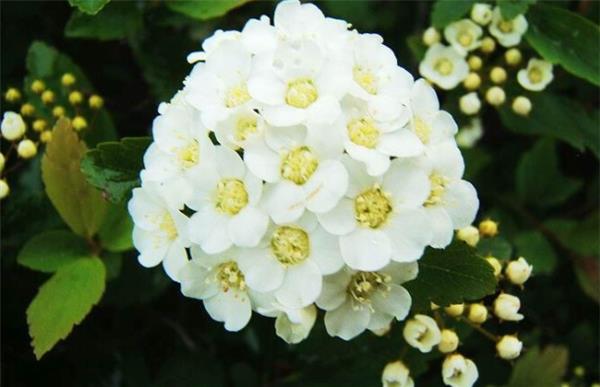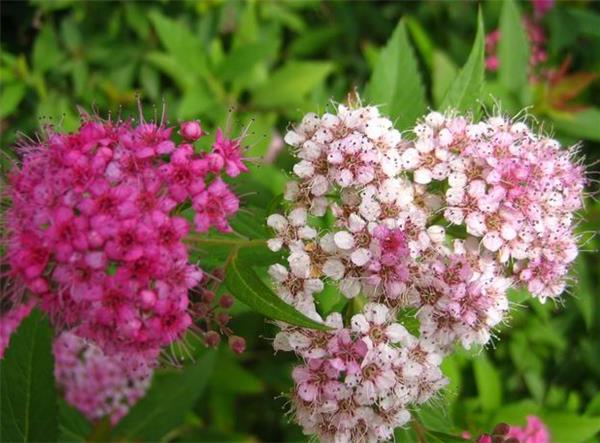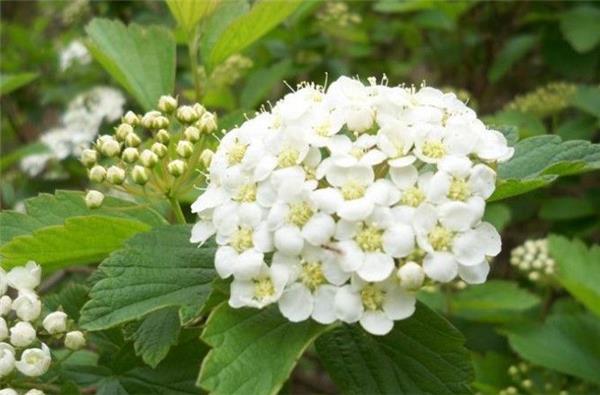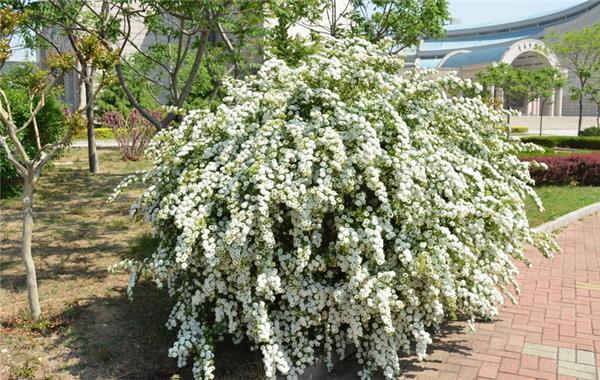Introduction and Culture methods of self-improving Flower Spiraea
Spiraea, also known as grasshopper tip, is a typical bisexual flower, mainly white color, flowering relatively long, so often used to do garden landscape cultivation planting. Let's take a look at the knowledge of Spiraea.

I. Introduction to Spiraea
Spiraea is a plant variety belonging to Spiraea of Rosaceae. Summer blooming pink bright flowers, cultivated for ornamental use, but also for nectar plants.

II. Morphological characteristics of Spiraea
Erect shrubs, 1-2 m tall; branches dense, branchlets slightly angular, yellow-brown, shoots pubescent, deciduous with age; winter buds ovate or oblong-ovate, apex acute, with several brown exposed scales, outer coat sparsely pubescent. Leaf blade oblong-lanceolate to lanceolate, 4-8 cm long, 1-2.5 cm wide, apex acute or acuminate, base cuneate, margin densely sharply serrate, sometimes doubly serrate, both surfaces glabrous; petiole 1-4 mm long, glabrous. Inflorescences oblong or pyramidal panicles, 6-13 cm long, 3-5 cm in diam., finely pubescent, densely flowered; pedicels 4-7 mm long; bracts lanceolate to linear-lanceolate, entire or with few serrations, puberulent; flowers 5-7 mm in diam.; calyx tube campanulate; sepals triangular, inner surface puberulent; petals ovate, apex usually obtuse, 2-3 mm long, 2-2.5 mm wide, pink; Stamens 50, ca. 2 times longer than petals; disk annular, lobes crenulate; ovary sparsely pubescent, style shorter than stamens. Follicles erect, glabrous or pubescent along ventral suture, style terminal, obliquely spreading, often with reflexed sepals. Flowering from June to August, fruiting from August to September. Plant height 30~50 cm, plant type plump nearly semi-circular, clustered. Leaves long ovoid or obovate, alternate. The new leaves are golden yellow, while the old leaves turn yellowish green and shiny. Deciduous erect shrub, up to 2m high, branches dense, branchlets angulate and short hairy, simple leaves alternate, leaves oblong-lanceolate, margin closely sharply serrate, both surfaces glabrous, petiole short, glabrous, oblong panicle borne on top of annual long leafy branches, can be 6-13cm long, hairy, flowers dense, bisexual flowers, umbels terminal, flowers pink, flowers short, petals pink, stamens 50 protruding petals, flowers with disk, bracts, calyx and sepals, all hairy, Follicles erect, ca. 5mm tall, hairy along ventral suture and with reflexed sepals, flowering 6-9 months, fruit ripe 8-10 months.

2. The reproduction mode of Spiraea
1. Sowing, dividing plants and transplanting can be done.
Spiraea can be propagated by seed or by insertion. When the seeds are ripe, they can be sown. The germination rate is high. Generally, seedlings can be grown in the second year. If a large number of seedlings are needed, it is best to adopt interplanting propagation. Spiraea chinensis, like other Compositae plants, has a high survival rate of interplanting and can reproduce except in winter, but the best effect of interplanting with 2 leaves is from May to September. Perlite, vermiculite or river sand with good water retention performance can be selected as the matrix of interplanting. selecting healthy and abundant branches of the current year as cuttings, soaking the branches in ABT rooting powder 50ppm, watering thoroughly after the cuttings and spraying the branches regularly. From May to September, the roots can be rooted in about 15 days, and the survival rate is above 80%.
2. anagen management
Spiraea is fertilized twice a year, once in winter and organic fertilizer in winter or early spring, and once after falling flowers, fertilizer is applied. General spiraea tree fertilization, can take the method of hole application, that is, in the crown: the edge of the positive projection line, dig a depth of about 10 cm circular groove, fertilizer application. This method is not only simple but also beneficial to root absorption. Later, with the growth of trees, the diameter and depth of the circular groove for fertilization will increase. Good drainage ventilation requirements, timely cultivation. According to the tree needs reasonable watering, spraying new lipid membrane fertilizer preservation moisture.

3. pruning and curing
Pruning is mainly to cut off withered branches, excessive branches, overlapping branches and diseased branches. Spiraea is very resistant to cold and drought. If you prune the branches and leaves, then Spiraea will work hard to grow new branches and leaves. After pruning, the branches should be promptly coated with callus antiseptic film to make the wounds heal quickly and prevent the invasion of germs after rain, resulting in decay. In flower bud differentiation stage, spraying Cuhuawang No. 3 can transform plant vegetative growth into reproductive nutrition, inhibit main shoot crazy growth, promote flower bud differentiation and bloom more flowers. Spiraea chrysanthemum safe winter, must spray tree general protection tree body antifreeze, expel winter virus, pests landed on the tree body reproduction, urge fruit trees early hibernation, restore vitality.
The above is the knowledge of Spiraea, I hope it can help you.
Urge fruit trees to hibernate early and recover vitality.
The above is the knowledge of Spiraea, I hope it can help you.
Related
- Wuhan Hospital Iron Tree Blooming Result Was Instantly Frightened by the Gardener Master
- Which variety of camellia is the most fragrant and best? Which one do you like best?
- What is the small blue coat, the breeding methods and matters needing attention of the succulent plant
- Dormancy time and maintenance management of succulent plants during dormancy
- Minas succulent how to raise, Minas succulent plant pictures
- What are the varieties of winter succulent plants
- How to raise succulent plants in twelve rolls? let's take a look at some experience of breeding twelve rolls.
- Attention should be paid to water control for succulent plants during dormant period (winter and summer)
- Watering experience of twelve rolls of succulent plants
- Techniques for fertilizing succulent plants. An article will let you know how to fertilize succulent plants.



